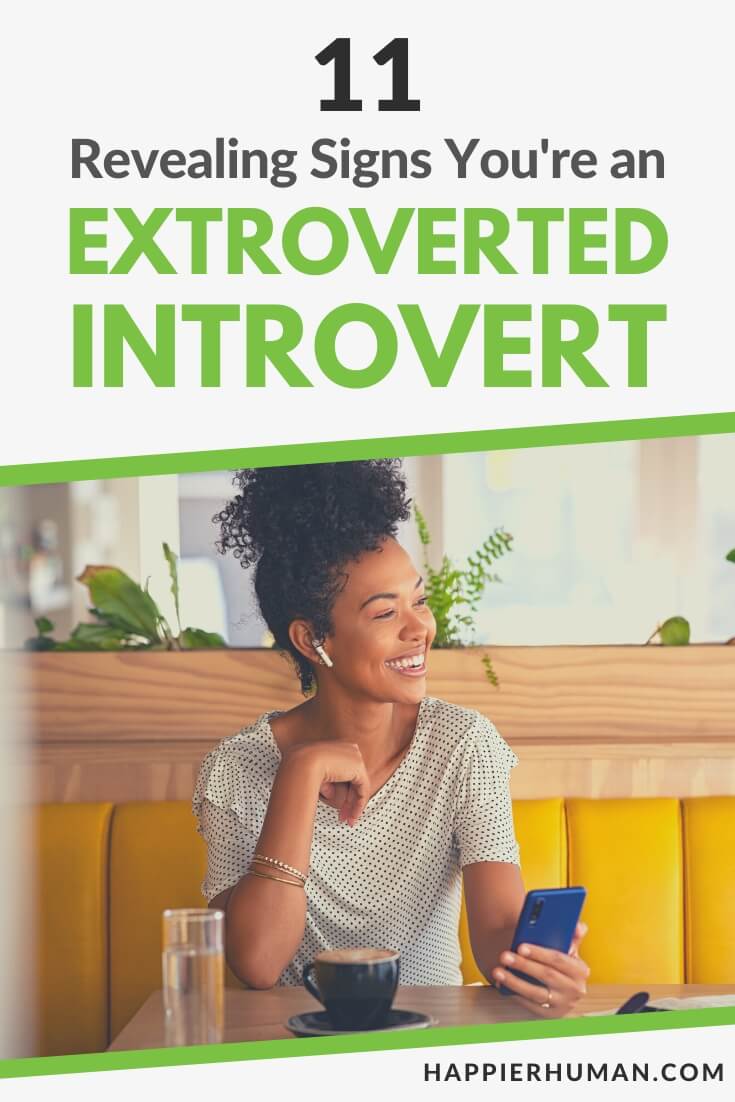I have a dear friend named Gemma, and over the years, I have gotten to know her pretty well (or at least I'd like to think so). Some days she is enthusiastic, driven, and lives life to the fullest. On other days she doesn't answer texts and cancels our planned coffee dates.
Sometimes I worry that I may have done something to upset her… or that something might be wrong in general. Do you have a friend like this? Or do you find yourself feeling like Gemma? Excited one minute and then needing some alone time to catch your breath the next?
If you are struggling to define your personality: you're too extroverted to be an introvert, but on some days, you feel too introverted to be an extrovert, then rest assured that you aren't alone.
I’ve found there is more to it than just being an extrovert or an introvert. There's a place in between known as an extroverted introvert (or an ambivert for short). But before we dive into that, let's break it down by looking at each type first:
What Is an Extrovert?
According to the dictionary, an extrovert is an outgoing, socially confident person. While that pretty much sums it up, there is much more to an extrovert than just a person who loves parties and being the center of attention.
Even though extroverts come across as confident, they need to be around people to recharge their “batteries” (mind and body). Being alone is a big no-no for them, and they become anxious and bored when they are alone.
Picture an extrovert waking up in the morning. Their “battery” is on 2 bars. They get dressed and head out to meet some people. Each social interaction adds another bar to their battery. By the time they get home, they are fully charged and feeling great.
As the day comes to an end and they have fewer social interactions, their bars start dropping again.
Here's a look at some common (and popular) characteristics of an extrovert:
What Is an Introvert?
The dictionary defines an introvert as a shy, reticent person. Yes, pretty much, but just like an extrovert, there is much more to an introvert than just a shy person. Unlike an extrovert, introverts actually lose energy from social interactions.
Picture an introvert waking up in the morning with a full battery. They head out to work, and every social interaction takes away one bar off their battery. By the time they get home, they're running on empty.
To recharge, an introvert needs to be alone. In fact, they are their best selves when they're on their own, doing the things that make them happy (binge-watching Netflix, painting, or reading, for example).
Unfortunately, introverts get a bad rap as being “too quiet” and unfriendly, and most people think introverts place themselves on a pedestal. But this couldn't be further from the truth. Taking the time to get to know an introvert is worth the initial awkwardness.
Here's a look at some common (and popular) characteristics of an introvert:
What Is an Extroverted Introvert?
An extroverted introvert is also known as an ambivert. The dictionary defines this type of person as “a person who has a balance of extrovert and introvert characteristics in their personality.” So basically, an ambivert has the best of both worlds.
An ambivert's battery is filled by interacting with people (like an extrovert) and by being alone (like an introvert). Ambiverts need both sides to be fulfilled. This personality type is often mistaken as an extrovert because they're outspoken, but they also gain energy from having some alone and quiet time.

An ambivert has traits of both extraversion and introversion. So, when they wake up in the morning, they need interaction with both sides to fill their battery. Some people energize them, while others drain their batteries completely. It has a lot to do with their likes and dislikes.
With an extroverted introvert, it's kind of an either or situation. For example, either you find people intriguing, or you find them exhausting.
Fun Fact: An ambivert makes a better salesperson than an extrovert or an introvert, as they are naturally good at listening and talking. They don't dominate a conversation (like an extrovert) or remain silent (like an introvert).
11 Revealing Signs You’re an Extroverted Introvert
Here are 11 revealing signs that you might be an extroverted introvert:
1. You’re Often Mistaken for an Extrovert
One of the first signs that you may be an ambivert is when people mistake you for an extrovert. Sure, you're outgoing, and you enjoy spending time with people, but at the same time, you enjoy being alone and having some quiet time.
It also has much to do with your personality, likes, and dislikes. You may find that some people bring out the extroverted side of you, while others make you want to seek the comfort of your own space.
It comes down to how you regain your energy. Do people drain you or fill you up? If this is a tricky question to answer and you feel torn between the two, then you're most likely an extroverted introvert.
2. People Come to You for Advice
An extraverted introvert has a calm confidence that surrounds them. Do you find that people (sometimes even strangers) come up to you and start talking about their lives and troubles? This is because ambiverts have the ability to listen and show empathy when people need to be heard.
Extroverts offer solutions straight away in their excitement, and a person can't get a word in edgewise. Introverts will listen but sometimes zone out (retreat within themselves) mid-conversation.
On the other hand, an ambivert will give you their full attention and won't interrupt you. An extroverted introvert usually asks deep questions to try and understand the other person's situation before offering advice.
3. You Get Along With People, But Also Like Being Alone
Ambiverts are great at making new friends and fitting in with a crowd, but sometimes it becomes too much for them. An extroverted introvert enjoys making other people happy. Whether it's by offering advice or trying to make them laugh. Unfortunately, these interactions take a lot of energy.
Let's face it, trying to stay connected with someone can be mentally draining, and ambiverts know when they need a break. If you get along well with people but also enjoy the comfort of your own company, then this is a clear sign that you may be an ambivert.
4. You’re Social Battery Is Affected by the Environment
As we know, an ambivert experiences extroversion and introversion to varying degrees. Their decisions are often swayed by how they feel at that specific moment (including the current environment they are in).
For example, if a friend calls and invites you to a pop-up theater, you might have some questions first. Who will be there? Do you think it'll be fully booked? Based on the answers, an ambivert will weigh the pros and cons and probably choose to join their friend.
When they arrive, they'll be in their element. However, as the evening goes on, they can feel their social battery draining. The music might be too loud, or the night air is too warm, and they start looking for ways to retreat.
Unlike an introvert, an ambivert is still keen to go out and see where the evening takes them. They're perfectly happy with either outcome and don't feel bad if they have to leave. An introvert would rather skip the whole thing.
5. You Always Have an Exit Plan
Have you ever gone on a date, but before leaving, you ask your best friend to help you with an escape plan? Yeah? You'd be surprised how many people actually do this. As an ambivert, your introverted side will expect the date to go horribly and that you should rather stay in.

But your extroverted side is curious. So to satisfy both needs, you give your friend strict instructions to call you at a certain time and tell you there is an emergency at home. Depending on how the date is going, you'll either use the call as an excuse to leave, or you'll stick it out a bit longer.
Because ambiverts are empathetic, they'll always try to find an excuse that won't offend anyone.
6. People Intrigue and Exhaust You
At social gatherings, you'll often see that one person who is cheerful and talkative, but also seems to stand alone in a quiet area during the event. Ambiverts find people intriguing and enjoy getting to know them.
But, at the same time, certain people absolutely exhaust them. This is when an ambivert will blend into the background and rather enjoy the event from a distance. This is how they recharge their batteries.
The interesting thing is that one person can intrigue and exhaust an ambivert at the same time. If you think you're an extroverted introvert, you have probably experienced this to some degree.
7. You Don’t Enjoy Small Talk
“I dislike small talk.” Does this sound like you? Extroverted introverts don't enjoy small talk (also known as phatic communication) at all. This is where their introverted side is stronger. Small talk feels fake to an ambivert and doesn't fill their batteries.
An ambivert finds this extremely dull and struggles to pay attention to the other person.
They find it difficult and uncomfortable to chat about the weather or what a person ate for breakfast (#WhoCaresAboutThatAnyway?). They want deeper conversations that have a meaningful outcome (#LifeLoveAndEverythingElse). Simply speaking to avoid an awkward silence is not at the top of their agenda.
If you're an ambivert, you'll probably be the one asking the questions, as ambiverts have an amazing ability to make people feel comfortable. But they would rather say nothing at all than engage in small talk.
8. You Take a While to get Comfortable
Unlike an extrovert, ambiverts take a little longer to get comfortable with a person or a situation. They need to push themselves harder, but they're still more comfortable than introverts.
An extrovert is more than happy to spill the beans on their lives and give their opinions (even when no one asks). Extroverted introverts like to spend their time wisely, so to do this, they need to check out the situation and see if it's worth their time.
They are usually quieter and standoffish if they don't feel comfortable. But, if an ambivert enjoys your company and blossoms around you, they'll open up and tell you more about themselves.
9. You Dislike the Spotlight
An ambivert has no real issue with taking the center stage. However, they don't enjoy doing this for long periods. This sign can be confusing as you feel confident enough to stand in the spotlight (this is the extroverted side speaking) and suddenly feel really uncomfortable being in the spotlight (this is your introverted side talking).
Again, this has a lot to do with the social situation and the type of people around you at the time. An ambivert loves being in the spotlight, but spending too much time there really exhausts them.
It all comes down to whether you feel more extroverted or introverted that day. Your friends might also struggle to read your moods, as you struggle to figure it out. Let's put it this way; you'll never really know how an ambivert will react until they react.
10. You’re Selective About Your Tribe
Extroverted introverts are very undecided and can experience different moods throughout their day. As a result, they can be very selective over who they spend their time with in a more personal setting.
As friendly and approachable as an ambivert can be, they can also be withdrawn and moody, and this is often mistaken for rudeness.

While an ambivert is usually surrounded by people, much like an extrovert, no one really knows them (even those closest to them). They enjoy being around people who don't take offense easily, as they will more often cancel on you.
This doesn't mean they don't like you. It just means they're tired, and their social battery is running low. Once they've had some alone time, they'll be back and full of fun.
11. You’re a Party Pooper
So you are super excited about a weekend away with some friends. You've ticked all the boxes on the checklist, joined in on the group chats, and you're all packed. It's all good. You're feeling good.
But, when you arrive, your feelings suddenly change. This can be very frustrating for you and your friends, because the truth is, you were really committed to going along, and you were looking forward to it.
An introvert would have said no right off the bat. An extrovert would have been on your doorstep the night before and raring to go. An ambivert feels excited and exhausted just thinking about it, and this often leads to them changing their minds and bailing at the last minute.
Final Thoughts on Revealing Signs You’re an Extroverted Introvert
Now that you've read through these revealing signs that you might be an extroverted introvert, I am sure you've realized there's no real solid answer. Ambiverts move between moments of being extroverted and introverted.
So as wonderful as it is to have the best of both worlds, finding your place on the spectrum can also be a real struggle. And it can take a real toll on your psyche and social interactions.
I often feel for dear Gemma as she struggles with finding her own spot on the scale of introversion and extroversion. Mostly, she’s in the middle—an ambivert—but every so often she slides off the introversion scale and avoids me. Then there are days when she seems on a sugar rush of excitement to see me as she hits the extroversion end. Never fixed—a real ambivert.
At the end of the day, most of us have a little bit of both in us. We want to get out there and step into the spotlight, but at the same time, we also seek the comfort of our own company. Either way, we’ll be ok.
If you enjoyed these revealing signs and feel you're leaning more toward being an introvert, check out our guide on the 17 signs that you're probably an introvert. However, if you’re more of an extrovert struggling to understand an introvert, then you could also check out our guide to 15 ways to respond when an introvert ignores you.
Finally, if you want to identify YOUR personality type, then take one of these 11 personality tests to better understand what makes you tick.


